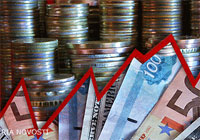Putin relatively satisfied with Russian economic performance in 2012

MOSCOW. Jan 16 (Interfax) – Russia’s economic performance was “relatively satisfactory” in 2012, Russian President Vladimir Putin said at a meeting dedicated to economic affairs at the Kremlin.
“The economic results of the year have not yet been conclusively summed up, but the preliminary figures look relatively satisfactory. According to the Economic Development Ministry’s estimates, GDP growth for January-November of last year was 3.5%. The year finished with low unemployment by both Russian and global standards, at 5.4%,” Putin said.
Preliminary estimates indicate that the 2012 budget was executed without a deficit, “significant reserves” grew, and inflation was 6.6% “due to fluctuations in prices for food products,” he said. In the previous decade, from 2000 to 2010, inflation averaged at 12.75%, Putin added.
“Growth in the real working wage demonstrated a positive dynamic for the 11 months – it was 8.8%. Investment growth accelerated, reaching 8.4% against the same period of last year for the 11 months,” Putin said.
However, on the backdrop of these positive trends, Russia’s galloping economic performance throughout the year is cause for concern, he said.
“There aren’t yet final numbers for December. They might possibly prove more encouraging, but the results for November instill some concern. According to the Economic Development Ministry’s estimates, annual GDP growth is slowing. In November it was just 1.2%, whereas for the first months of last year it was 4.9%. In the second quarter as a whole, GDP growth was 4%, and in the third it fell to 2.9%,” Putin said.
Industrial production and investments are also demonstrating this fading dynamic, and several problems are being observed in agriculture, as well. However, Putin stressed that Russia “is in a state to provide itself with grain and even maintain significant export potential,” whereas in the previous 20-30 years it was a net grain importer.
The global economic situation and the state of the financial markets were quite tense in 2012, which also impacted the Russian economy, he said.
“For the majority of the countries in the world, for the majority of economies, the second half of the year was less successful than the first, but, of course, we need to see if that is the only problem. We need to look at our domestic problems, domestic issues, and most importantly, how to react to the problems that are emerging in both the global economy and in ours,” Putin said.
“Europe’s debt problems were complicated by emerging difficulties in the banking sector, and as a result, in the second half of the year, the region ended up in a recession. But despite that, we are also well aware that the eurozone’s leaders are still demonstrating a positive dynamic, and that’s very good. But nevertheless, the complications in Europe generally impacted the global economy and other countries, including the BRICS countries, and us in particular,” Putin said.
He warned that the lull on financial markets might be temporary, and the Russian authorities should be ready for that.
Fluctuations on global markets primarily affected the volatility of the Russian financial and forex markets. The ruble’s exchange rate was in constant flux throughout the year, and such a state of affairs has already become customary, Putin said.
